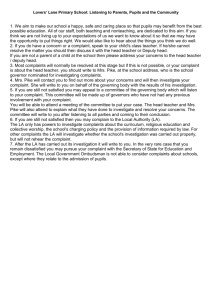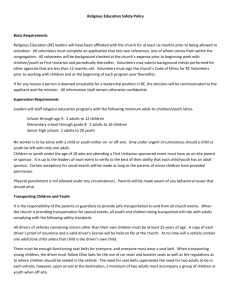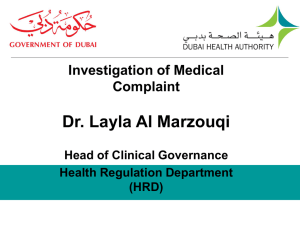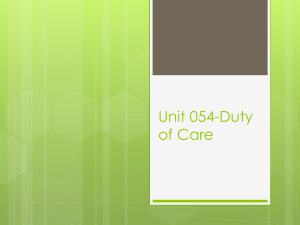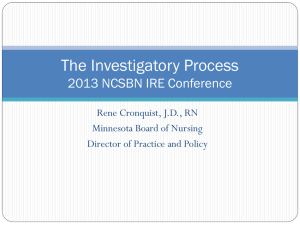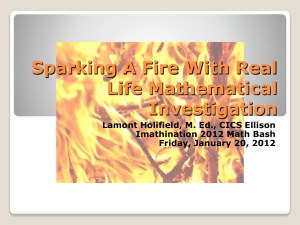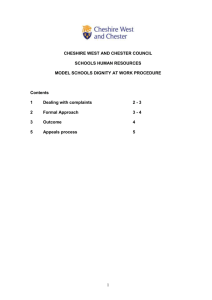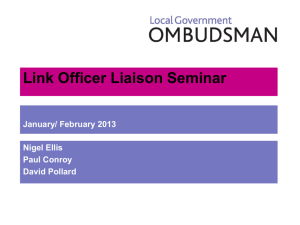Powerpoint Slides - NSW Health Care Complaints Commission
advertisement
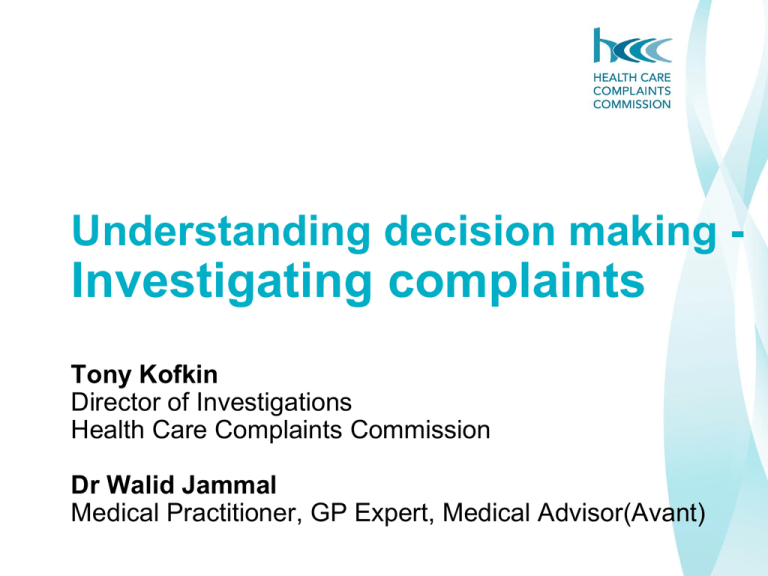
Understanding decision making - Investigating complaints Tony Kofkin Director of Investigations Health Care Complaints Commission Dr Walid Jammal Medical Practitioner, GP Expert, Medical Advisor(Avant) Investigating complaints The Commission must investigate complaints that: Raise significant issues of public health or safety or significant questions as to the appropriate care or treatment of a client by a health service provider. If substantiated would provide grounds for disciplinary action against a health practitioner Appears to be a breach of the Code of Conduct for unregistered health practitioners that is considered a risk to the health or safety of the public Who was referred for investigation 2013-14? Investigating complaints During an investigation evidence is gathered from a variety of sources that may prove or disprove the allegations raised in a complaint Commission has powers to compel information. External expert’s advice is crucial in determining whether or not to take disciplinary action. Investigating complaints Before finalising an investigation, Commission presents its findings to the relevant provider and invites their submission If the provider is a registered practitioner, the Commission consults with the relevant professional council -> All parties are informed about the outcome of the investigation Outcomes of investigations Outcomes of investigations 2013-14 Role of an expert during investigation Experts are recruited through Colleges and Associations and are provided with regular training by the Commission Experts are matched as closely as possible to the provider who is subject of the investigation Expert is provided with all relevant material and asked to provide their expert opinion When evaluating the evidence, expert refers to what would be a reasonable standard for practitioners in the same profession with an equivalent level of training or experience There may be different versions of events- it is NOT the expert’s role to judge the credibility of these versions – different opinions may be needed for different versions Role of an expert during investigation Expert, based on the facts presented to them, formulates an opinion by : Defining where the reasonable standard of care lies – not “the gold standard” and not “best practice” Deciding whether the practitioner departed from the standard expected from someone of equivalent level of training or experience Deciding whether the departure from the standard was significant Deciding whether this departure would invite strong criticism from the profession Role of an expert during investigation Expert needs to clearly define the reasons for the opinion, citing reference material and/or experience Expert needs to be careful about hindsight bias; outcome bias; retrospective micromatching Distinguish between standard of the records vs standard of care An expert must remain in their level of expertise Case 1 – Alternative medicine The complaint Dr G was a doctor who practised “alternative medicine”. He believed in the value of manipulation of the spine in order to correct problems of blood flow to the brain. He developed a philosophy that most illness can be cured by manipulation of the cervical spine. For example, a child with pneumonia; a person with inflamed conjunctiva; a child with autism; a person with tonsillitis. -> Doctor was assessed by Medical Council and suspended, complaint referred to Commission to investigate Case 1 – Alternative medicine How the expert adviser approached the case • the standard of care was clearly defined • the manipulation embarked upon was in no way indicated; no evidence at all • not expected from a GP; no peer would ever agree. -> significant departure from accepted standards • Given the multitude of patients, and the strict adherence by Dr G to such a philosophy -> strong criticism Case 1 – Alternative medicine Decision The investigation was referred to the Commission’s Director of Proceedings to consider prosecution before a Tribunal or Professional Standards Committee Ultimately, Dr G was de-registered by Tribunal for a minimum period of three years Case 2 – phone consultations The complaint Dr S was engaged to undertake phone consultations for a sexual health clinic. Dr S prescribed medications which were off label, which were then purchased from the same company that engaged Dr S. The Commission alleged that Dr S failed to: physically examine the patient before recommending a treatment program that lasted for about 18 months at a cost of almost $4,000 discuss alternative treatment options keep appropriate medical records of the consultation. Case 2 – Phone Consultations The main issues for the expert to consider were: • Whether selling of these medications presented a conflict of interest • Off label use of medication • Informed consent issue. Whether any other choices of treatment were discussed • Whether conducting phone consults with new patients is sufficient and reasonable • Adequacy of medical records -> Expert found significant departure in relation to most of the above points and was strongly critical. Case 2 – Phone Consultations Decision • Investigation was referred to the Director of Proceedings who determined to prosecute before a Professional Standards Committee • Committee found most of complaint proven (except lack of follow up recommendation) and reprimanded the practitioner Summary – Decision making when investigating complaints There is a legislated threshold for the Commission to investigate a complaint (section 23 HCCA 1993) Commission has extensive powers to obtain information Commission commonly tasks experts to evaluate relevant evidence Provider always has the opportunity to make a submission Where required, the Commission consults wit the relevant professional Council
